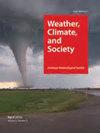飓风劳拉和莎莉:新冠肺炎时代的疏散决策案例研究
IF 1.9
4区 地球科学
Q3 ENVIRONMENTAL STUDIES
引用次数: 1
摘要
这项研究考察了在疫苗广泛可用之前,受飓风劳拉(新冠肺炎大流行期间第一次大规模飓风疏散)和飓风萨利影响的居民的风险认知和疏散计划。对大流行期间飓风疏散行为和风险感知的研究对于量化这些复杂威胁的交叉点至关重要。分析捕捉了人们对公共避难所的看法,以及疏散选择是否因疫情而改变。许多研究参与者认为自己容易感染新冠肺炎(39.4%),三分之二的人认为,如果他们或他们的亲人感染新冠肺炎,情况将“非常严重”,但这对他们的实际疏散决策没有影响。大约75%的样本在飓风劳拉或莎莉期间留在家中,其中略高于80%的样本表明新冠肺炎是一个有点重要的决定因素。这反映了新冠肺炎在复杂灾害期间平衡个人和家庭保护行动决策方面发挥的部分作用。15.5%的人希望撤离,但一直等到为时已晚。对于那些疏散到酒店的人,许多人发现工作人员和客人都戴着口罩,在公共场所保持社交距离。特别令人感兴趣的是,与新冠肺炎大流行前相比,个人对公共避难所抵御新冠肺炎的能力持续持负面看法,同时2020年可能使用避难所的受访者人数大幅减少。这些结果已经并将为当前或未来的大流行或传染病爆发期间的未来减灾规划提供信息。本文章由计算机程序翻译,如有差异,请以英文原文为准。
Hurricanes Laura and Sally: A Case Study of Evacuation Decision-Making in the Age of COVID-19
This study examines risk perceptions and evacuation planning for those residents affected by Hurricane Laura–the first major hurricane evacuation during the COVID-19 pandemic–and Hurricane Sally, prior to the widespread availability of vaccines. Research on hurricane evacuation behavior and risk perceptions during a pandemic is critical for quantifying the intersect of these compounding threats. Analyses captured how people perceive public shelters and whether evacuation choices changed in light of the pandemic. Many study participants considered themselves vulnerable to COVID-19 (39.4%) and two-thirds believed it would be “very serious” if they or their loved ones contracted COVID-19, but this had no impact on their actual evacuation decision-making. Approximately 75% of the sample stayed at home during Hurricanes Laura or Sally, and of these, just over 80% indicated that COVID-19 was a somewhat important deciding factor. This reflects the partial role that COVID-19 played in balancing individual and household protective action decision-making during complex disasters. Whereas 15.5% wanted to evacuate but waited until it was too late. For those who evacuated to a hotel, many found that staff and guests wore masks and socially distanced in common spaces. Of particular interest is that individuals have a continued negative perception of public shelters’ ability to safeguard against COVID-19 which was coupled with a significant decrease in the number of respondents that would potentially use shelters in 2020 compared to before the COVID-19 pandemic. These results have and will inform future hazard mitigation planning during the current or future pandemic, or infectious disease outbreaks.
求助全文
通过发布文献求助,成功后即可免费获取论文全文。
去求助
来源期刊

Weather Climate and Society
METEOROLOGY & ATMOSPHERIC SCIENCES-
CiteScore
3.40
自引率
13.60%
发文量
95
审稿时长
>12 weeks
期刊介绍:
Weather, Climate, and Society (WCAS) publishes research that encompasses economics, policy analysis, political science, history, and institutional, social, and behavioral scholarship relating to weather and climate, including climate change. Contributions must include original social science research, evidence-based analysis, and relevance to the interactions of weather and climate with society.
 求助内容:
求助内容: 应助结果提醒方式:
应助结果提醒方式:


